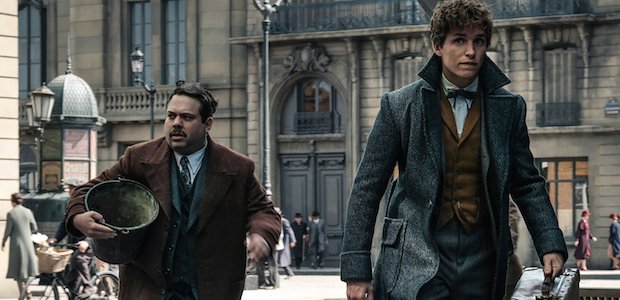In pop culture, we are living in the age of the fan. Never before have audiences had so many options for entertainment available at any given time. Superhero cinematic universes and heavily serialized television programs are notable extensions of this, and it stretches to the world of Harry Potter as well.
In fact, David Yates' Fantastic Beasts: The Crimes of Grindelwald is a perfect example. The movie is solid and loaded with fun characters and sequences, but it's also a ride that is designed specifically to be enjoyed by those who have long invested their hearts into the Wizarding World. However, it's also a double-edged sword. While you also have to admire the movie's commitment and confidence in itself, it's definitely going to leave some crowds feeling like they are on the outside looking in.
The second chapter in the Fantastic Beasts series, and based on the second screenplay from author J.K. Rowling, The Crimes of Grindelwald picks up a year after its predecessor and begins as its titular villain (Johnny Depp) makes a daring jailbreak in hopes of continuing his mission: finding the powerful young wizard Credence Barebone (Ezra Miller) and convincing him to join his side. Of course, Grindelwald being free sets off all kinds of alarms, and it's not long before news gets back to England and magizoologist/burgeoning celebrity Newt Scamander (Eddie Redmayne).
Having had some experience with Grindelwald in the last movie, Newt knows exactly what it is that the dark wizard is trying to do, but also can't legally do anything about it because of a punishment that forbids him from international travel. Plus, unlike his bureaucrat brother Thesueus (Callum Turner), he's also not entirely comfortable choosing sides in the imminent war. This all changes, however, when friends Queenie (Alison Sudol) and Jacob (Dan Fogler) arrive from New York with news that Queenie's sister Tina (Katherine Waterston) is in Paris looking for both Grindelwald and Credence -- and the legendary Dumbledore (Jude Law) asks for Newt's help in the matter.
That description probably isn't going to make a lot of sense to those who don't have at least some background with this property -- and that's on purpose, in that it's representative of the mode in which Fantastic Beasts: The Crimes of Grindelwald operates from the start. Being the tenth chapter in a movie franchise that has earned over $8 billion to date, it has a strong expectation of the audiences' presumed knowledge, and doesn't slow down once it gets rolling. The perfect example of this? It never actually features or explains what the "crimes of Grindelwald" are.
For the die-hards, this will be seen as a blessing, as few things will take you out of a movie faster than a string of exposition filled with information that you already know. If you're not a person who is aware of the Lestrange family, know what a Boggart is, or can immediately recognize the halls of Hogwarts, though, Fantastic Beasts: The Crimes of Grindelwald is trouble. It's a film that throws you into the deep end of the pool, telling you to sink or swim, and while it's possible to tread and keep your head above water, it doesn't exactly make for a wholly satisfying experience.
It speaks to the comfortability of J.K. Rowling as a creator, and is an advancement for her as a novelist-cum-screenwriter following Fantastic Beasts And Where To Find Them. The sequel is much more tonally consistent than the previous movie (opting to be more Prisoner of Azkaban than Sorcerer's Stone), and it seems to have a much clearer idea of the larger story that it wants to tell. However, Rowling also does seem to still be adjusting to the very different way information is offered on screen versus in text, with certain bits coming across as throttling in their delivery.
With so much going on, it's the characters that ground Fantastic Beasts: The Crimes of Grindelwald, as it plays host to charming and engaging performances from its talented ensemble. Eddie Redmayne's Newt Scamander remains a strange, atypical franchise lead (what with his regular inability/hesitance to make eye contact with the people he's talking to), but his charisma comes from his amiability, and his general attitude makes his bold stances all the more powerful. What's more, this is a story that tests him, and forces some very important decisions that move the character forward in key ways.
Similar sentiments can be shared about the majority of the returning Fantastic Beasts cast (though there are some spoilery controversial choices made that can't be discussed at this time), but unfortunately those particularly excited for the roles played by Jude Law and Johnny Depp may walk away underwhelmed. In the case of the former, Dumbledore has only a very minor part in Fantastic Beasts: The Crimes of Grindelwald, straight-up benched by the Ministry of Magic in the middle of the movie, and Law only has a handful of scenes to establish his take on the great wizard.
Grindelwald is the bigger disappointment, though, with most issues stemming from the lack of any kind of meaningful engagement with the character. At the very start we learn through expositional dialogue that he is a smart and dangerous manipulator, but despite seeing a plethora of recruits, we never actually see him fully execute this skill. Instead, we simply know what he's doing, and we're told it's bad... and that's about it. Rather than coming across as scary or dangerous, he is merely painted as Representative Antagonist who we only know is sinister because the heroes don't like him. For all of the controversy surrounding Johnny Depp's casting, it's strange just how underutilized he is.
Fantastic Beasts: The Crimes of Grindelwald is a film where what you get out of it is heavily dependent on what you bring into it. It's competently made, with David Yates bringing that familiar Harry Potter world aesthetic back for the sixth time, but your appreciation for it is going to entirely depend on the context in which you personally put it. It's a movie built special for aficionados of the Wizarding World, and while there's nothing wrong with that in this age of fandom, it's an element that demands consideration before purchasing a ticket.

Eric Eisenberg is the Assistant Managing Editor at CinemaBlend. After graduating Boston University and earning a bachelor’s degree in journalism, he took a part-time job as a staff writer for CinemaBlend, and after six months was offered the opportunity to move to Los Angeles and take on a newly created West Coast Editor position. Over a decade later, he's continuing to advance his interests and expertise. In addition to conducting filmmaker interviews and contributing to the news and feature content of the site, Eric also oversees the Movie Reviews section, writes the the weekend box office report (published Sundays), and is the site's resident Stephen King expert. He has two King-related columns.











